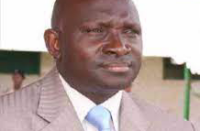As The Gambia joined the rest of the world to observe World AIDS Day on Sunday, the country’s Minister of Health and Social Welfare, Dr. Ahmadou Samateh, reiterated government’s commitment to fighting HIV/AIDS, which continues to be one of the country’s major health problems.
“The Gambia will remain committed to creating the enabling environment through concrete actions and policy engagement with a view to strengthening the gains made in its national response for HIV/AIDS,” Dr. Samateh said in a statement delivered on behalf of President Adama Barrow at Paradise Suites Hotel where major stakeholders gathered to take stock of the progress being made in the response efforts.
Over the years, the National AIDS Secretariat (NAS), Actionaid International, and the Ministry of Health have been making giant strides in the fight against the pandemic. This year’s theme is “Communities Make a Difference” with a view to making sure that communities take centre stage in the formulation of adequate strategies to fight HIV/AIDS.
The Gambia’s top health official said the actions taken by government are in line with promises made at the 2006 United Nations high-level meeting on HIV/AIDS to scale up universal access to HIV prevention, treatment, care and support.
Minister Samateh revealed that government is already providing comprehensive affordable coverage for HIV patients in all the regions, including anti-retroviral treatment as well as mother to child transmission services. He said there are 14 anti-retroviral treatment centers, 57 PMTCT sites and 59 HIV counseling and testing sites established across the country.
Plans are underway, he went on, to increase HIV centers with a view to enhancing better coverage and access to services
United Nations Resident Coordinator, Seraphine Wakana, called for greater involvement and mobilization of communities to tackle the challenges that continue to hinder community delivery services, citing restrictions on registration and absence of social contracting modalities.
“We call for stronger advocacy role played by communities to ensure that AIDS remains on the political agenda, ensure human rights are respected and that decision-makers and implementers are held accountable,” she said.
She also reminded Gambian authorities about the need to ensure that at least 30% of HIV services are cimmunity-led while 6% of all HIV funding go to community mobilization.
The Chinese Ambassador to The Gambia, Ma Jianchun, highlighted the significant progress being made by African countries on AIDS prevention and control.
“A rising number of patients have been given treatment, the death rate is getting lower, and the number of children with AIDS is declining,” he remarked. He commended The Gambia government for making great progress in the fight against the global pandemic.
Nyansa Touray, who deputized for the Executive Director of Actionaid International Executive, said numerous efforts carried out by government and development partners in the past three decades have now yielded benefits as evidenced by the country’s earned stabilized epidemic status.
“We are proud that The Gambia continues to maintain a low but generalised epidemic in the general population but with pockets of other population cohorts registering unacceptably higher prevalence,” she said.
She called on participants to pay attention to the availability of funds needed to implement the programs, insisting on the need to close the gaps in HIV funding for prevention, treatment, care and support.
“Therefore, there is more need today than ever for more rigorous resource mobilisation and appropriate programming to eradicate HIV/AIDS in The Gambia,” she emphasised.
Ends




